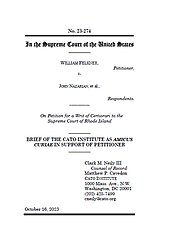Learn more about Cato’s Amicus Briefs Program.
Petitioner William Felkner considers himself a conservative libertarian. He enrolled in a masters degree program at the Rhode Island College School of Social Work in 2004. A professor soon told him that the School is committed to “social and economic justice” and that if Mr. Felkner consistently held dissenting views, he would not be a good fit for the profession. Another professor characterized “Republican ideology” as opposed to “the fundamental values of the social work profession.” Mr. Felkner was required to argue in favor of a legislative proposal he disagreed with. When he wrote a policy paper opposing the bill, he received a failing grade. Mr. Felkner also alleged that a professor initially denied him permission for an internship in the Rhode Island governor’s office because the social-work concentration “required him to defend liberal policies.”
Following another dispute, this time over his integrative project, Mr. Felkner sued under Section 1983, claiming that the College was violating his First Amendment rights. The Rhode Island Supreme Court recognized that Mr. Felkner’s rights were violated, but granted the defendants qualified immunity.
Cato filed an amicus brief asking the Supreme Court to reverse that decision and abolish qualified immunity. Neither Section 1983’s text nor the early history of constitutional torts justifies qualified immunity. In fact, courts have wrongly overlooked the fact that Section 1983—as originally enacted by Congress—forecloses qualified immunity. What is more, qualified immunity undermines public confidence in officials, including law enforcement and the courts, and is based on faulty assumptions about how official liability actually works. The mere fact that Congress has not done away with qualified immunity is no reason for the Court to maintain it as a bar to relief for Americans whose rights are violated. The Supreme Court should do away it.

This work is licensed under a Creative Commons Attribution-NonCommercial-ShareAlike 4.0 International License.

